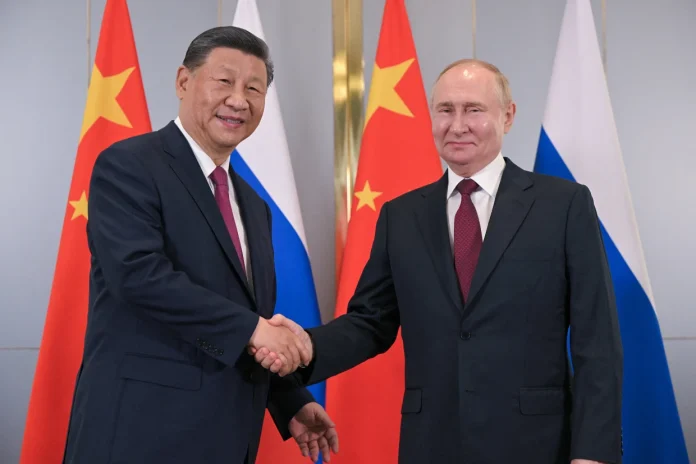ASTANA, Kazakhstan — In Astana, the capital of Kazakhstan, Russian President Vladimir Putin and Chinese President Xi Jinping convened at a summit of the Shanghai Cooperation Organization (SCO), underscoring its role as a bastion of global stability. Originally founded in 2001 by Russia, China, and Central Asian nations, the SCO has evolved under their stewardship to include India, Iran, and Pakistan, positioning itself as a counterbalance to Western influence.
Putin emphasized the SCO’s significance, describing it as a cornerstone of a just, multipolar world order. He praised the bilateral relations between Moscow and Beijing, asserting they were currently at their apex in history. “Our cooperation is not directed against any other nation,” Putin emphasized, “we are not forming blocs or alliances; we are simply advancing the interests of our people.”
Xi Jinping echoed Putin’s sentiments, stressing the enduring friendship between China and Russia amidst a dynamic global environment. He referred to Putin as an “old friend,” alluding to the advancements made in bilateral relations and future plans. Throughout the summit, Putin engaged in a series of bilateral meetings on the sidelines, affirming the strategic importance of the SCO gathering.
SCO’s agenda encompasses collaborative strategies to combat external security threats, including drug trafficking, while also addressing internal stability issues within member states. Ahead of meeting Xi, Putin held discussions with leaders such as Turkish President Tayyip Erdogan, Pakistani Prime Minister Shehbaz Sharif, and the presidents of Azerbaijan and Mongolia, Ilham Aliyev and Ukhnaagiin Khurelsukh.
Prime Minister Narendra Modi of India opted to send Foreign Minister Subrahmanyam Jaishankar to the summit, signaling India’s engagement amidst regional developments. The close partnership between China and Russia, characterized by a “no limits” approach since Putin’s visit to Beijing in February 2022, has deepened against the backdrop of global geopolitical shifts.
Both Xi and Putin perceive the post-Cold War international order dominated by the United States as eroding. The U.S. views China as its primary competitor and Russia as a significant national security threat, while President Joe Biden frames the 21st century as a struggle between democracies and autocracies.
During last year’s virtual summit, the SCO criticized the unilateral expansion of global missile defense systems, implicitly referencing NATO expansion and Western military support to Ukraine. Xi Jinping’s participation in a ceremony with Kazakhstan highlighted Beijing’s pragmatic, economy-driven approach, particularly evident in promoting the Trans-Caspian International Transport Route as a viable alternative to traditional Asia-Europe transit routes via Russia.
Belarus, attending the Astana summit as a full member for the first time, underscores the SCO’s expanding influence. United Nations Secretary-General Antonio Guterres’ presence at the gathering further underscores its global significance as a platform for dialogue and cooperation on regional and international issues.
In conclusion, the SCO summit in Astana reaffirms its pivotal role under the leadership of Putin and Xi in shaping a multipolar world order, fostering stability, and countering Western influence through strategic collaboration and diplomatic engagement among member states.


